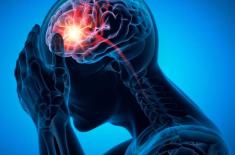
Stem Cell Therapy Shows Potential In Stroke Recovery
Fahad Shabbir (@FahadShabbir) Published September 18, 2025 | 12:15 PM

LONDON, (UrduPoint / Pakistan Point News / WAM - 18th Sep, 2025) Researchers from the Keck school of Medicine of the University of Southern California, the University of Zurich and ETH Zurich have co-developed an experimental stem cell therapy that shows promise in repairing damaged brain tissue after strokes.
According to a study published in the journal Nature Communications, transplanting neural stem cells one week after an ischaemic stroke in mice resulted in significant recovery.
The researchers reprogrammed human blood cells into neural stem cells, which can mature into neurons, and transplanted them into the damaged brain tissue of mice that had strokes. After five weeks, the researchers compared their recovery to a group of mice from the same litter that had strokes but underwent surgery without transplantation.
The treated mice displayed reduced inflammation, stronger blood vessels, improved neural connectivity, and less leakage from the blood-brain barrier compared to untreated mice.
The study found roughly a 50 percent reduction in neurons that secrete gamma-aminobutyric acid (GABA), which decreases activity in the brain cells to which it binds.
These GABA-secreting neurons, known as GABAergic neurons, have previously been shown to assist stroke recovery.
The team also explored the fate of the transplanted stem cells, finding that the majority had become GABAergic neurons. The treated mice also showed full recovery of fine motor skills and significant improvement in gait.
Ruslan Rust, Assistant Professor of Research Physiology and Neuroscience at the Keck School of Medicine, said that many patients are unable to receive emergency treatment within the limited timeframe. He added that the therapy could offer new recovery opportunities for those with long-term symptoms or extensive brain damage.
The research team is now studying the long-term effects of the therapy and exploring ways to enhance the signalling pathways involved in neural regeneration, with the aim of adapting the treatment for clinical application in humans.
Recent Stories

CCTV footage of firing outside actress Disha Patani’s house surfaces

Stem cell therapy shows potential in stroke recovery

Pakistan ready for India Clash in Super Four, says Salman Agha

Weather update: Rain, thunderstorms likely in Islamabad, other areas

Asia Cup2025; Pakistan qualify for Super Four by beating UAE

Al Seer Marine, BGN JV announce delivery of 3rd VLGC 'Merak'

Abu Dhabi launches AI-powered MRI technique for faster multiple sclerosis diagno ..

Currency Rate In Pakistan - Dollar, Euro, Pound, Riyal Rates On 18 September 202 ..

Today Gold Rate in Pakistan 18 September 2025

Egypt, Spain reaffirm rejection of Israeli attempts to displace Palestinians

Israeli massacre against displaced persons in Gaza raises today’s death toll t ..

Saudi Arabia, Pakistan sign strategic defence pact
More Stories From Middle East
-

Stem cell therapy shows potential in stroke recovery
7 minutes ago -

Al Seer Marine, BGN JV announce delivery of 3rd VLGC 'Merak'
2 hours ago -
Vietnam sees growth in European investment inflows
2 hours ago -

Abu Dhabi launches AI-powered MRI technique for faster multiple sclerosis diagnosis
2 hours ago -

Egypt, Spain reaffirm rejection of Israeli attempts to displace Palestinians
10 hours ago -

Israeli massacre against displaced persons in Gaza raises today’s death toll to 81
10 hours ago
-

Saudi Arabia, Pakistan sign strategic defence pact
11 hours ago -

AI to boost trade by nearly 40% by 2040: WTO
11 hours ago -

UAE welcomes agreement on roadmap to resolve crisis in Syria’s Suwayda
12 hours ago -

Abu Dhabi Chamber signs strategic cooperation agreement with Ghorfa Arab-German Chamber of Commerce ..
12 hours ago -

AD Ports Group awards contract for two shallow-draft container vessels for Caspian Sea operations
12 hours ago -
AFC Champions League 2: Al Wasl 7-1 Esteghlal
12 hours ago









